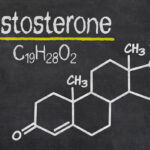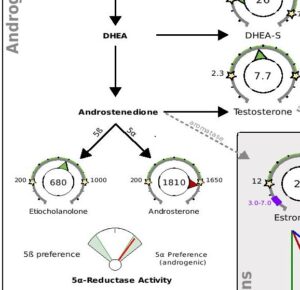 Do you suspect you suffer from hormone related issues? Maybe you already had blood tests carried out and your oestrogen or testosterone came back normal? Symptoms can be wide ranging across men and women but unless you get a full picture of what is actually going on it can be difficult to figure out the right support.
Do you suspect you suffer from hormone related issues? Maybe you already had blood tests carried out and your oestrogen or testosterone came back normal? Symptoms can be wide ranging across men and women but unless you get a full picture of what is actually going on it can be difficult to figure out the right support.
This is the fourth in our series of posts highlighting aspects of the DUTCH test. You can read about cortisol here, oestrogen metabolism here, and melatonin here. In this post we are discussing testosterone.
Testosterone to oestrogen
Oestrogen is typically thought of as a female hormone. However, a process known as aromatization may convert testosterone into oestrogen in the fat tissue and other places. Therefore, if a man is overweight or obese (ie with more fat tissue) his testosterone levels may be lower if it is being converted to oestrogen. Increased oestrogen in men can results in certain symptoms. They include fatigue, depression, low libido, erectile issues, weight gain, and breast development (gynecomastia).
Low levels?
The main male sex hormone, testosterone is also important for women. Signs of low levels may include poor libido, vaginal dryness and difficulty gaining muscle mass. This may be due to low DHEA (a precursor) or stress.
High levels
High levels are common in PCOS or women with fibroids. Not all women with PCOS will have high testosterone but those who do may experience acne, excess body or facial hair or even male pattern baldness. As outlined in the oestrogen post, the pathways these hormones are going down is just as important as the actual levels of the hormones. In the image below testosterone levels are normal but there is a preference for the 5-alpha reductase pathway.
5a-Reductase is the enzyme that supports conversion of testosterone to 5a-dihydrotestosterone – three times as potent as testosterone. Elevated levels are associated with obesity and insulin resistance in both men and women and also benign prostatic hypertrophy (BPH) and premature baldness in men.
Excess levels of testosterone may be reduced by including foods or supplements that inhibit the 5-alpha reductase enzyme. They are in foods such as brassica vegetables like broccoli, kale and cabbages. Certain medicinal mushrooms like reishi may be helpful along with other herbs. However, it is important to test first before using any supplements.
If you would like nutritional support or advice about testing, call us on 01 4020777 or book online now



